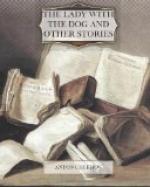Orlov returned to dinner next day, and they were reconciled.
The first Thursday afterwards Orlov complained to his friends of the intolerable life he led; he smoked a great deal, and said with irritation:
“It is no life at all; it’s the rack. Tears, wailing, intellectual conversations, begging for forgiveness, again tears and wailing; and the long and the short of it is that I have no flat of my own now. I am wretched, and I make her wretched. Surely I haven’t to live another month or two like this? How can I? But yet I may have to.”
“Why don’t you speak, then?” said Pekarsky.
“I’ve tried, but I can’t. One can boldly tell the truth, whatever it may be, to an independent, rational man; but in this case one has to do with a creature who has no will, no strength of character, and no logic. I cannot endure tears; they disarm me. When she cries, I am ready to swear eternal love and cry myself.”
Pekarsky did not understand; he scratched his broad forehead in perplexity and said:
“You really had better take another flat for her. It’s so simple!”
“She wants me, not the flat. But what’s the good of talking?” sighed Orlov. “I only hear endless conversations, but no way out of my position. It certainly is a case of ‘being guilty without guilt.’ I don’t claim to be a mushroom, but it seems I’ve got to go into the basket. The last thing I’ve ever set out to be is a hero. I never could endure Turgenev’s novels; and now, all of a sudden, as though to spite me, I’ve heroism forced upon me. I assure her on my honour that I’m not a hero at all, I adduce irrefutable proofs of the same, but she doesn’t believe me. Why doesn’t she believe me? I suppose I really must have something of the appearance of a hero.”
“You go off on a tour of inspection in the provinces,” said Kukushkin, laughing.
“Yes, that’s the only thing left for me.”
A week after this conversation Orlov announced that he was again ordered to attend the senator, and the same evening he went off with his portmanteaus to Pekarsky.
XI
An old man of sixty, in a long fur coat reaching to the ground, and a beaver cap, was standing at the door.
“Is Georgy Ivanitch at home?” he asked.
At first I thought it was one of the moneylenders, Gruzin’s creditors, who sometimes used to come to Orlov for small payments on account; but when he came into the hall and flung open his coat, I saw the thick brows and the characteristically compressed lips which I knew so well from the photographs, and two rows of stars on the uniform. I recognised him: it was Orlov’s father, the distinguished statesman.
I answered that Georgy Ivanitch was not at home. The old man pursed up his lips tightly and looked into space, reflecting, showing me his dried-up, toothless profile.
“I’ll leave a note,” he said; “show me in.”




